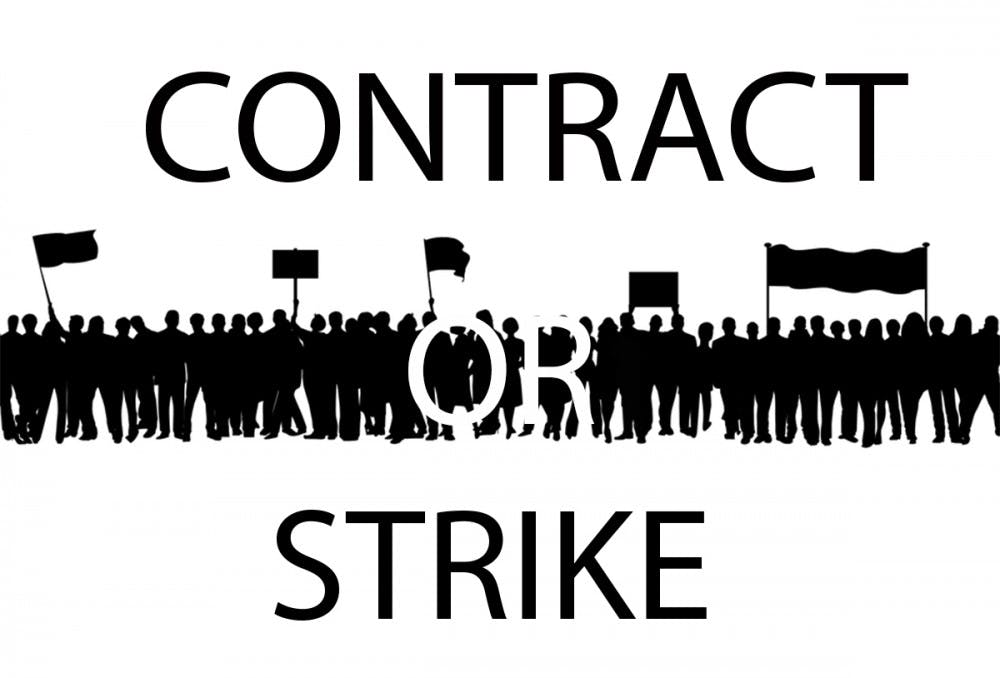Professors and coaches of Pennsylvania’s state universities have not ruled out going on strike during the fall semester if they cannot negotiate new terms for their contract.
The Pennsylvania State System of Higher Education (PASSHE) is currently working with the Association of Pennsylvania State College & University Faculties (APSCUF) to agree on salaries and working conditions, said Brendan Finucane, president of Shippensburg University’s chapter of APSCUF.
Negotiations in Harrisburg, where PASSHE is based, are entering a more serious phase, Finucane said. APSCUF faculty members voted not to strike this semester or the beginning of the summer. They will make the decision in the coming months, based on how well negotiations go for them.
“Our hope is we will make progress at the negotiating table this spring and summer,” Finucane said. “We want a fair contract.”
Some specific terms of the contract that are causing disagreements include: An increased workload for temporary faculty, an increased number of temporary faculty members and a mandate that professors teach online courses, Finucane said.
Rising healthcare costs is the current issue that is preventing APSCUF and PASSHE to agree on a contract, said Kenn Marshall, PASSHE’s media relations manager.
PASSHE is offering faculty a salary increase in exchange for paying more for healthcare benefits. The money generated from that scenario will help PASSHE offset its $10 million deficit.
“We have to be realistic with the funding we get from the state,” Marshall said. To maintain the level of benefits APSCUF and other PASSHE employees receive, costs have to rise. If PASSHE does not charge APSCUF more, he said, the money either has to come from the state or the students.
“They are the heart and soul of our organization,” Marshall said of faculty members. He said PASSHE may have to extend the terms of the old contract, which members of APSCUF have been working under since last July.
The next round of negotiations will be held Friday. APSCUF has routinely been taking votes on whether to strike, and a strike is not inevitable, even if summer negotiations do not make progress.
“We are committed to reaching an agreement — as long as it takes,” he said.
If negotiations fail to resolve the dispute over the summer, and the faculty go on strike, Shippensburg University students will experience various consequences.The professors would not hold classes in person or online, nor would they have advising meetings, meet with committees, advise clubs or use campus email, according to an APSCUF press release.
SU has, and will, continue to work on a strike response plan, which is a series of guidelines on how to handle various situations, said SU president George “Jody” Harpster.
SU would meet the needs of the students, but classes would not be held until the strike ends. Once it finishes, administrators and faculty members would work together to make the best of the situation, he said. Adding evening classes, extending the semester and not having fall break are possible ways that students to catch up on work.
“The goal of the university is for you to not have lost any academic progress,” Harpster said, referring to SU’s students.
“Their issue isn’t you. Their issue is their pay, or their benefits. You become the collateral damage of that in a sense. They are not intending to hurt you.”
One of the primary reasons a strike was not held this semester is because of the impact it would have on the students, Finucane said. If summer meetings do not make progress, things may change.
“Out of concern for students, APSCUF campus delegates voted not to strike in Spring 2016,” the press release states. “Your faculty members do not want to strike, but they will if they are forced to.”




The Slate welcomes thoughtful discussion on all of our stories, but please keep comments civil and on-topic. Read our full guidelines here.